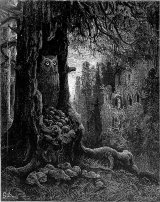The Owl and the Mice
The Owl and the Mice is a fable by Jean de La Fontaine about an unlikely alliance. In the story, an owl saved from a mob of birds by mice begins to act as a protector for the mice, even as it harbors its desire to hunt and eat them. The tale explores themes of nature, survival, and the complex dynamics of relationships that differ in power.
Whene'er you have a tale to tell, Ne'er call it marvellous yourself, If you would have it go down well, For, if you do, some spiteful elf Will scorn it; but for once I'll vow The tale that I shall tell you now Is marvellous, and though like fable, May be received as veritable. So old a forest pine had grown, At last 'twas marked to be cut down. Within its branches' dark retreat An Owl had made its gloomy seat-- The bird that Atropos thought meet Its cry of vengeance to repeat. Deep in this pine-tree's stem, time-worn, With other living things forlorn, Lived swarms of Mice, who had no toes; But never Mice were fat as those, For Master Owl, who'd snipped and torn, Day after day fed them on corn. The wise bird reasoned thus: "I've oft Caught and stored Mice within my croft, Which ran away, and 'scaped my claws; One remedy is, I'll cut their paws, And eat them slowly at my ease-- Now one of those, now one of these. To eat them all at once were blameful, And my digestion is so shameful." You see the Owl was, in his way, As wise as we; so, day by day, His Mice had fit and due provision. Yet, after this, some rash Cartesian Is obstinate enough to swear That Owls but mechanism are. But how, then, could this night-bird find This craftily-contrived device, The nibbling of the paws of mice, Were he not furnished with a mind? See how he argued craftily: "Whene'er I catch these Mice, they flee; And so the only way to save them Is at one huge meal to brave them. But that I cannot do; besides, The wise man for bad days provides. But how to keep them within reach? Why, neatly bite the paws from each." Now, could there, gentle reader mine, Be human reasoning more fine? Could Aristotle's self have wrought A closer chain of argued thought?
Translation
Translate and read this book in other languages:
Select another language:
- - Select -
- 简体中文 (Chinese - Simplified)
- 繁體中文 (Chinese - Traditional)
- Español (Spanish)
- Esperanto (Esperanto)
- 日本語 (Japanese)
- Português (Portuguese)
- Deutsch (German)
- العربية (Arabic)
- Français (French)
- Русский (Russian)
- ಕನ್ನಡ (Kannada)
- 한국어 (Korean)
- עברית (Hebrew)
- Gaeilge (Irish)
- Українська (Ukrainian)
- اردو (Urdu)
- Magyar (Hungarian)
- मानक हिन्दी (Hindi)
- Indonesia (Indonesian)
- Italiano (Italian)
- தமிழ் (Tamil)
- Türkçe (Turkish)
- తెలుగు (Telugu)
- ภาษาไทย (Thai)
- Tiếng Việt (Vietnamese)
- Čeština (Czech)
- Polski (Polish)
- Bahasa Indonesia (Indonesian)
- Românește (Romanian)
- Nederlands (Dutch)
- Ελληνικά (Greek)
- Latinum (Latin)
- Svenska (Swedish)
- Dansk (Danish)
- Suomi (Finnish)
- فارسی (Persian)
- ייִדיש (Yiddish)
- հայերեն (Armenian)
- Norsk (Norwegian)
- English (English)
Citation
Use the citation below to add this book to your bibliography:
Style:MLAChicagoAPA
"The Owl and the Mice Books." Literature.com. STANDS4 LLC, 2025. Web. 14 Jan. 2025. <https://www.literature.com/book/the_owl_and_the_mice_2669>.




Discuss this The Owl and the Mice book with the community:
Report Comment
We're doing our best to make sure our content is useful, accurate and safe.
If by any chance you spot an inappropriate comment while navigating through our website please use this form to let us know, and we'll take care of it shortly.
Attachment
You need to be logged in to favorite.
Log In